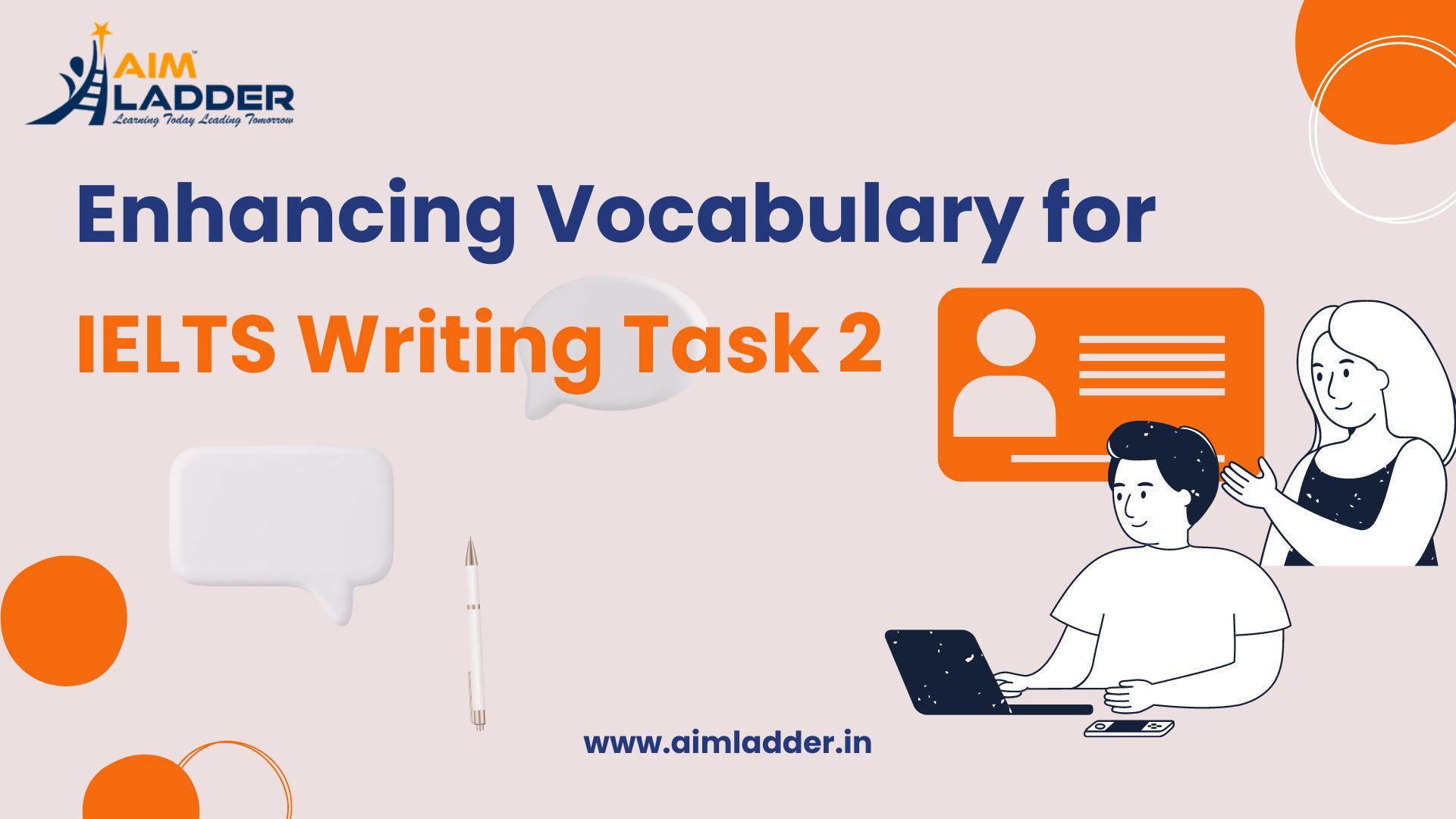- Services
-
-
Test Preparation
-
Study Abroad Services
Visitor, Tourist & Dependent Visas
-
-
-
- Study Destinations
-
-
Top Study Destinations
-
-
-
-
- About Us
- Contact Us
- Blog
Enhancing Vocabulary for IELTS Writing Task 2

Achieving a high band score in the IELTS Writing Task 2 requires not only coherent and well-structured arguments but also a rich and varied vocabulary. An extensive lexicon not only enhances the depth of your writing but also showcases your language proficiency. Below, we explore essential vocabulary categories along with examples that can elevate your Task 2 essays.
1. Introducing Opinions:
- Advocate: To recommend or support.
- Many experts advocate stricter regulations to combat climate change.
- Contend: To argue a viewpoint.
- Some contend that technology has exacerbated social isolation.
- Assert: To state confidently.
- It can be asserted that education is fundamental to societal progress.
2. Describing Positive and Negative Trends:
- Proliferation: Rapid increase in numbers.
- The proliferation of smartphones has revolutionized communication.
- Decline: Decrease in value or importance.
- There has been a decline in traditional family values in urban societies.
- Rapid: Happening quickly.
- Rapid urbanization poses significant challenges to sustainable development.
3. Presenting Causes and Effects:
- Contribute to: To add to or assist in.
- Poor infrastructure contributes to traffic congestion in cities.
- Lead to: To result in.
- Lack of access to healthcare can lead to higher mortality rates.
- Trigger: To cause something to start.
- Economic instability triggered by inflation affects global markets.
4. Contrasting Ideas:
- Nevertheless: In spite of that.
- The project faced many challenges; nevertheless, it was completed on time.
- Conversely: In an opposite manner.
- While some prefer urban living, others, conversely, enjoy rural tranquility.
- On the contrary: Used to introduce a different viewpoint.
- Many believed the policy would fail; on the contrary, it succeeded.
5. Giving Examples:
- For instance: As an example.
- Many cities are investing in renewable energy; for instance, Copenhagen.
- Such as: Used to specify examples.
- Several factors, such as education and income, influence social mobility.
- Including: Introducing additional examples.
- Various technologies, including artificial intelligence, are shaping industries.
6. Emphasizing Importance:
- Crucial: Extremely important.
- Access to clean water is crucial for public health.
- Essential: Absolutely necessary.
- A healthy diet is essential for overall well-being.
- Paramount: Of the highest importance.
- It is paramount to address climate change through international cooperation.
7. Concluding and Summarizing:
- Ultimately: Finally or in the end.
- Ultimately, the success of the project depended on community involvement.
- In summary: To sum up.
- In summary, economic growth must be balanced with environmental protection.
- To conclude: To finish an argument or discussion.
- To conclude, technological advancements have both benefits and drawbacks.
8. Expressing Agreement:
- Concur: To agree.
- Many scientists concur that climate change is a pressing issue.
- Endorse: To support or approve.
- Leading economists endorse policies aimed at reducing income inequality.
- Substantiate: To provide evidence to support a claim.
- The data substantiates the theory that exercise improves mental health.
9. Discussing Solutions:
- Implement: To put a plan into action.
- Governments should implement stricter regulations to protect endangered species.
- Propose: To suggest a plan or idea.
- Researchers propose new methods for sustainable agriculture.
- Adopt: To accept or approve.
- Countries should adopt renewable energy sources to reduce carbon emissions.
10. Emphasizing Importance:
- Imperative: Absolutely necessary or crucial.
- It is imperative to address the issue of access to education in rural areas.
- Vital: Essential or important.
- Conserving natural resources is vital for future generations.
- Critical: Of vital importance.
- Efforts to combat poverty in developing countries are critical to global stability.
11. Explaining Causes and Effects:
- Consequence: A result or effect of an action or condition.
- The consequence of deforestation is the loss of biodiversity.
- Impact: The effect or influence of one thing on another.
- Technological advancements have had a significant impact on global economies.
- Ramification: A consequence of an action or decision.
- The ramifications of climate change are far-reaching and affect every ecosystem.
12. Contrasting Ideas:
- In contrast: Used to show the difference between two things.
- In contrast to traditional farming methods, hydroponics requires less water.
- Alternatively: Introducing another possibility.
- Alternatively, some argue that investing in education is more effective than military spending.
- On the other hand: Introducing a different perspective.
- Some believe globalization benefits economies; on the other hand, it can lead to cultural homogenization.
13. Describing Trends and Patterns:
- Fluctuate: To vary irregularly.
- Prices of commodities often fluctuate due to market demand.
- Surge: To increase suddenly and strongly.
- There has been a surge in online shopping due to the COVID-19 pandemic.
- Plateau: To reach a stable level or stage.
- After years of growth, the population growth rate has plateaued.
14. Giving Examples:
- Illustrate: To provide an example or explanation.
- To illustrate, renewable energy sources such as solar and wind power are sustainable alternatives.
- Demonstrate: To show or prove.
- Research demonstrates that exercise can improve cognitive function.
- Exemplify: To be a typical example of something.
- Countries like Sweden exemplify successful models of sustainable development.
15. Concluding and Summarizing:
- Conclusively: In a way that settles an argument or discussion.
- Conclusively, economic policies must prioritize environmental sustainability.
- To summarize: To give a brief statement of the main points.
- To summarize, technological advancements have transformed various industries.
- In conclusion: To bring a final statement to an argument.
- In conclusion, education plays a pivotal role in individual and societal development.
16. Describing Positive and Negative Aspects:
- Boon: Something beneficial or advantageous.
- Technological advancements have been a boon to healthcare.
- Bane: Something that causes distress or annoyance.
- Social media addiction is considered a bane of modern society.
- Prospect: The possibility or likelihood of future success.
- There is a bright prospect for economic growth in emerging markets.
17. Discussing Changes and Developments:
- Evolving: Gradually developing or changing.
- The role of women in society is evolving rapidly.
- Revolutionize: To completely change something.
- The internet has revolutionized the way we access information.
- Adaptation: The process of adjusting to new conditions.
- Successful adaptation to climate change requires innovative solutions.
18. Explaining Causes and Effects:
- Undermine: To weaken or damage gradually.
- Corruption undermines trust in government institutions.
- Exacerbate: To make a problem or situation worse.
- Poor urban planning exacerbates traffic congestion.
- Mitigate: To make less severe or intense.
- Efforts to plant more trees can mitigate the effects of air pollution.
19. Emphasizing Importance:
- Crucial: Extremely important or necessary.
- Access to clean water is crucial for public health.
- Paramount: Of the highest importance or significance.
- Preserving biodiversity is paramount to the survival of ecosystems.
- Indispensable: Absolutely necessary or essential.
- Education is indispensable for economic development.
20. Giving Examples:
- Illustrate: To demonstrate or clarify by giving examples.
- To illustrate, countries like Norway have successfully implemented sustainable energy policies.
- Cite: To mention as an example or to support an argument.
- Many experts cite technological innovation as a key driver of economic growth.
- Highlight: To emphasize or draw attention to something important.
- Recent studies highlight the impact of climate change on vulnerable communities.
21. Contrasting Ideas:
- Discrepancy: A difference between two or more things.
- There is a significant discrepancy between urban and rural incomes.
- Divergent: Moving apart or differing from each other.
- Their opinions on healthcare policy are divergent.
- Distinct: Clearly different or separate.
- The two cultures have distinct traditions and customs.
22. Concluding and Summarizing:
- Conclusively: In a way that settles an argument or discussion.
- Conclusively, technological advancements have transformed various industries.
- To summarize: To give a brief statement of the main points.
- To summarize, globalization has both benefits and challenges.
- In conclusion: To bring a final statement to an argument.
- In conclusion, sustainable development requires global cooperation.
Conclusion
Building a diverse vocabulary is a gradual process that requires regular practice and exposure to various contexts. Incorporating these words and phrases into your IELTS Writing Task 2 essays can significantly enhance your ability to articulate complex ideas clearly and effectively. Remember to use them appropriately and in context to maximize their impact. With consistent effort and practice, you can confidently navigate the vocabulary demands of the IELTS and achieve your desired band score.
By expanding your vocabulary arsenal and mastering its usage, you not only improve your chances of success in the IELTS but also enhance your overall proficiency in English communication. Keep practicing and exploring new words to further refine your writing skills for academic and professional endeavors.





